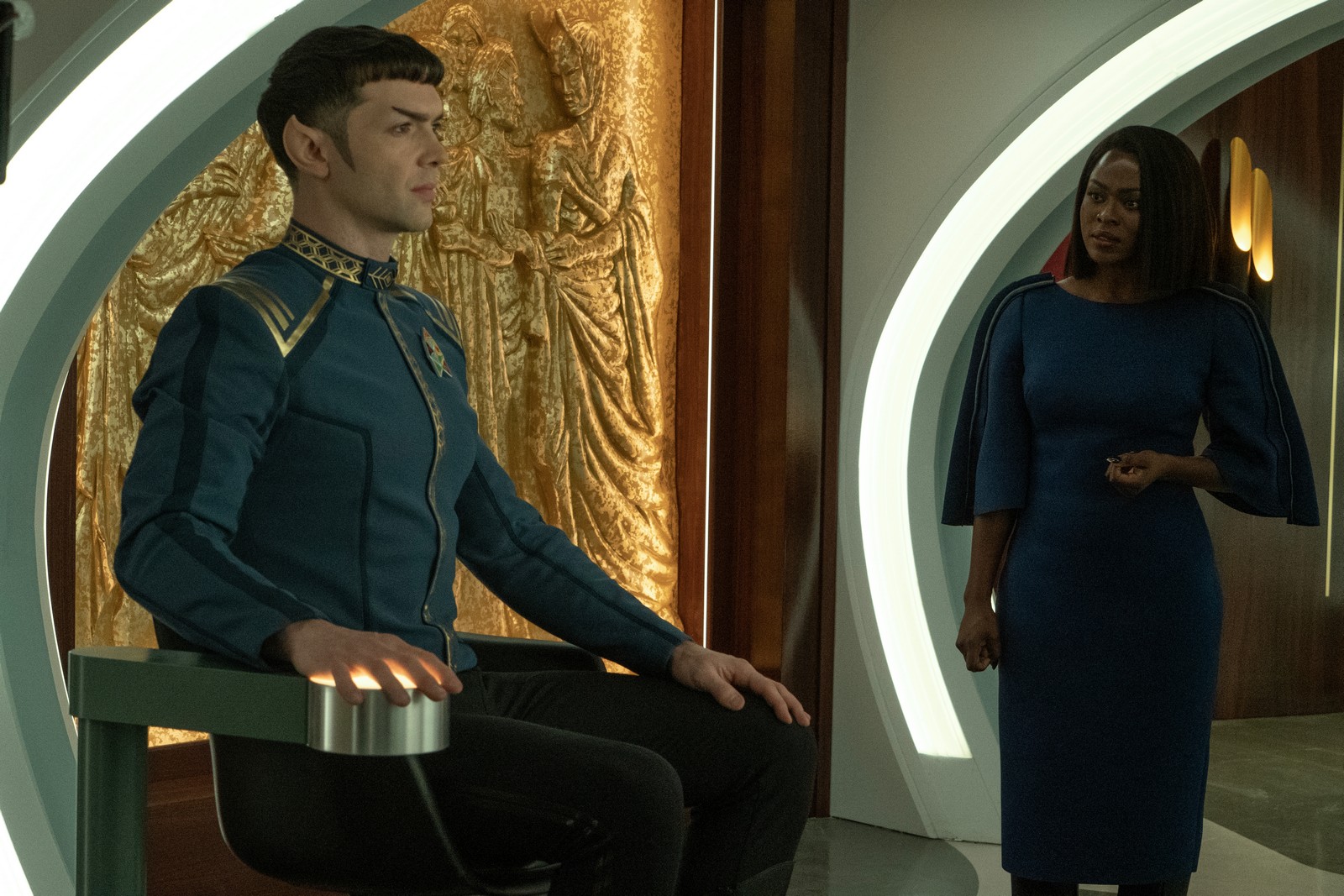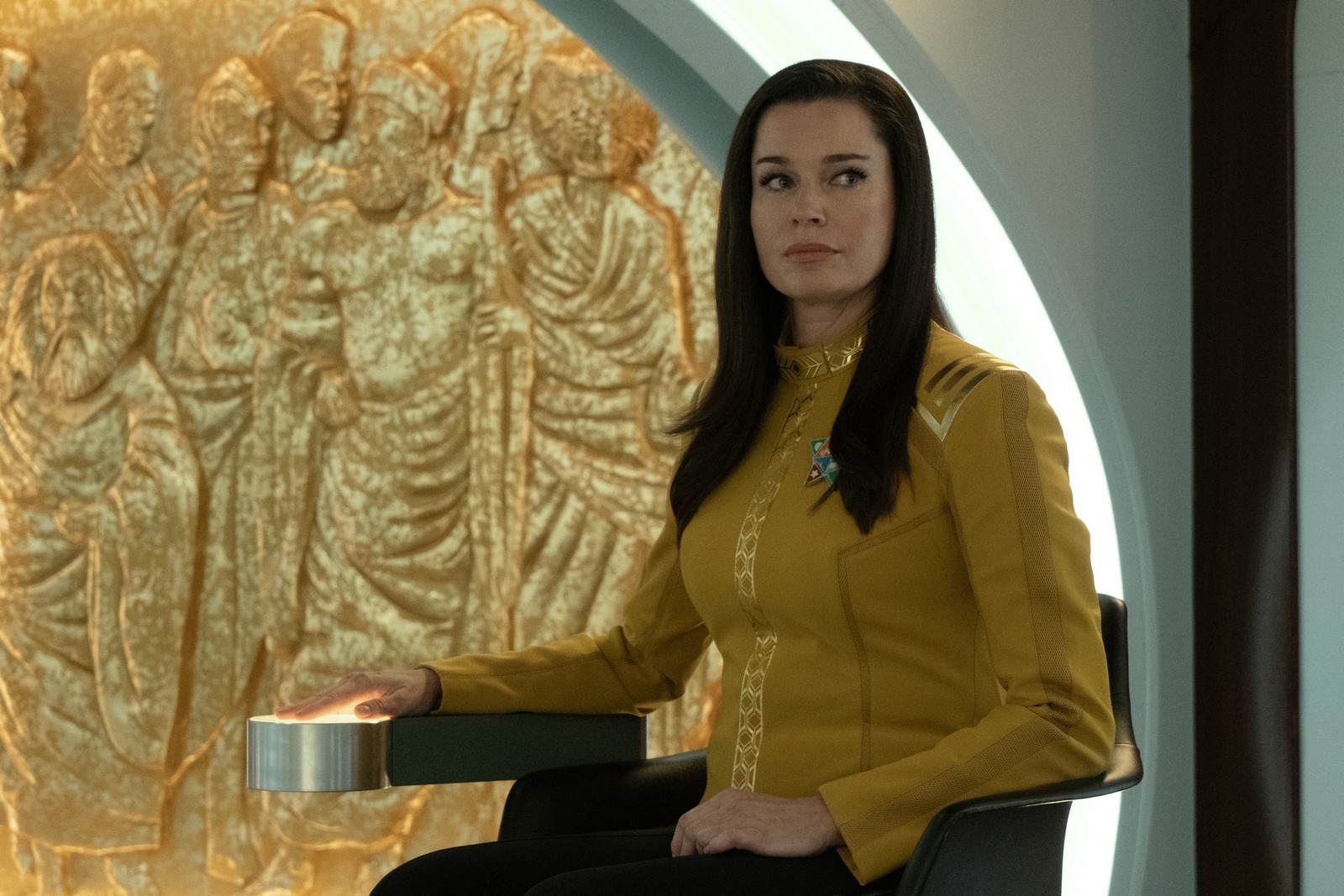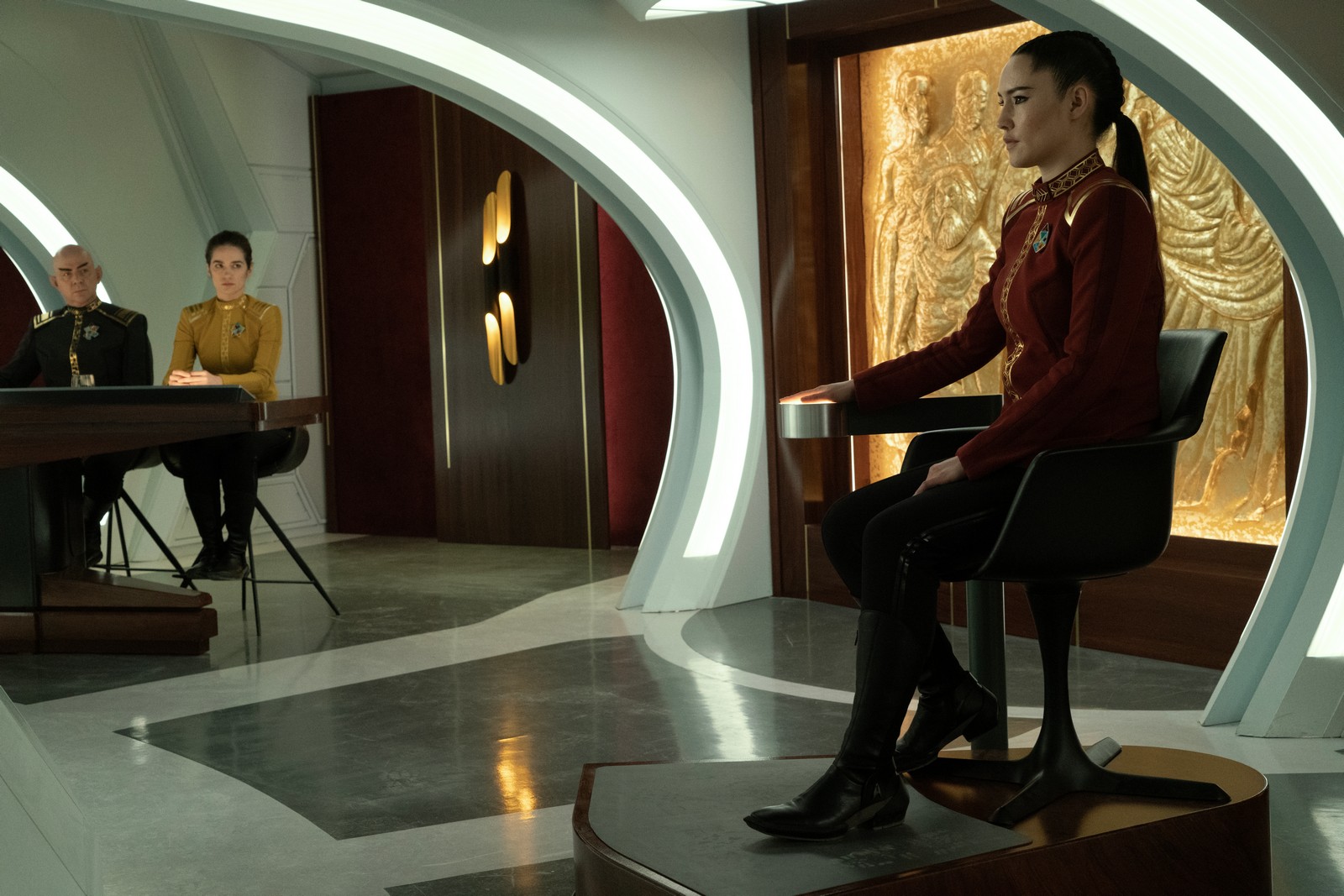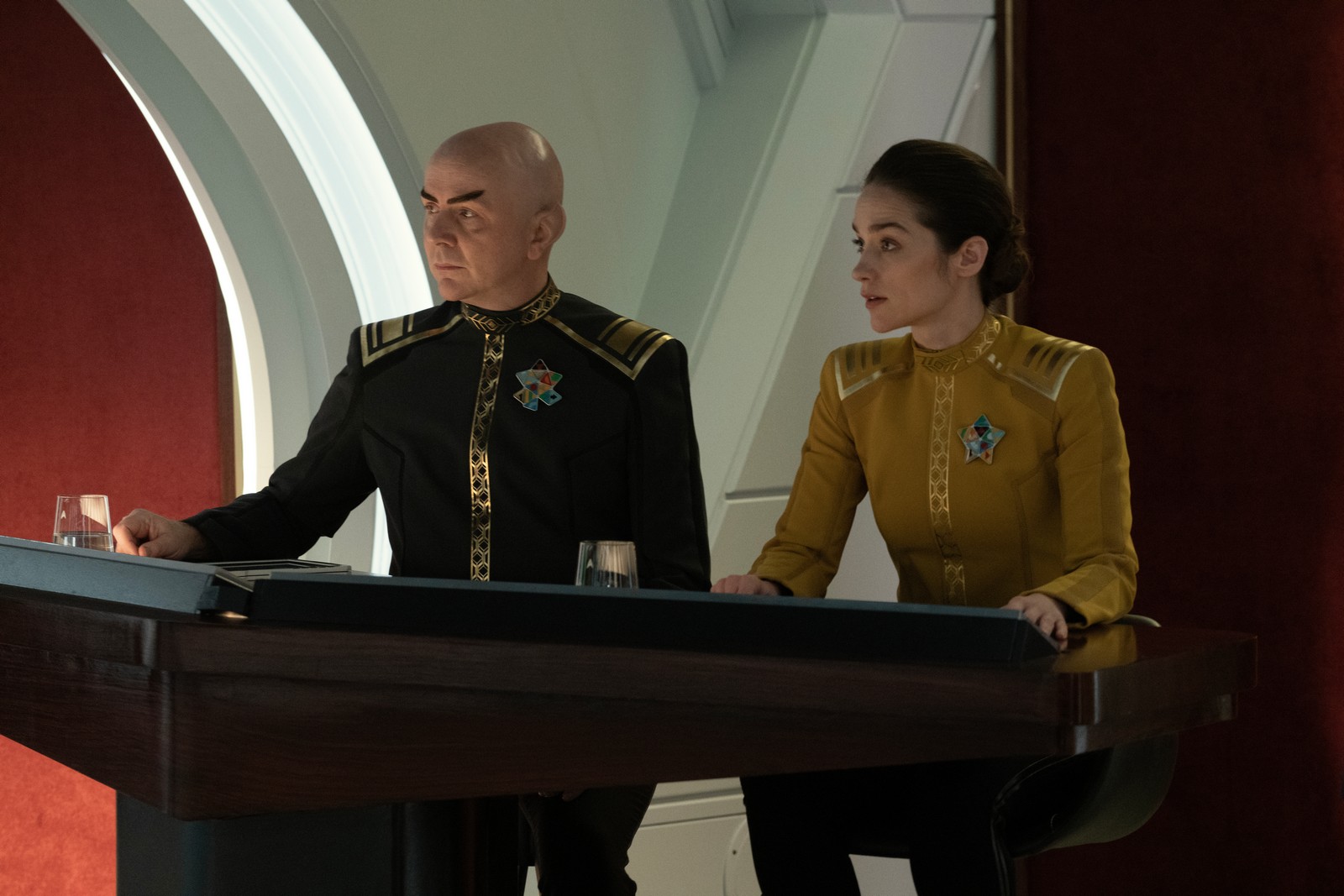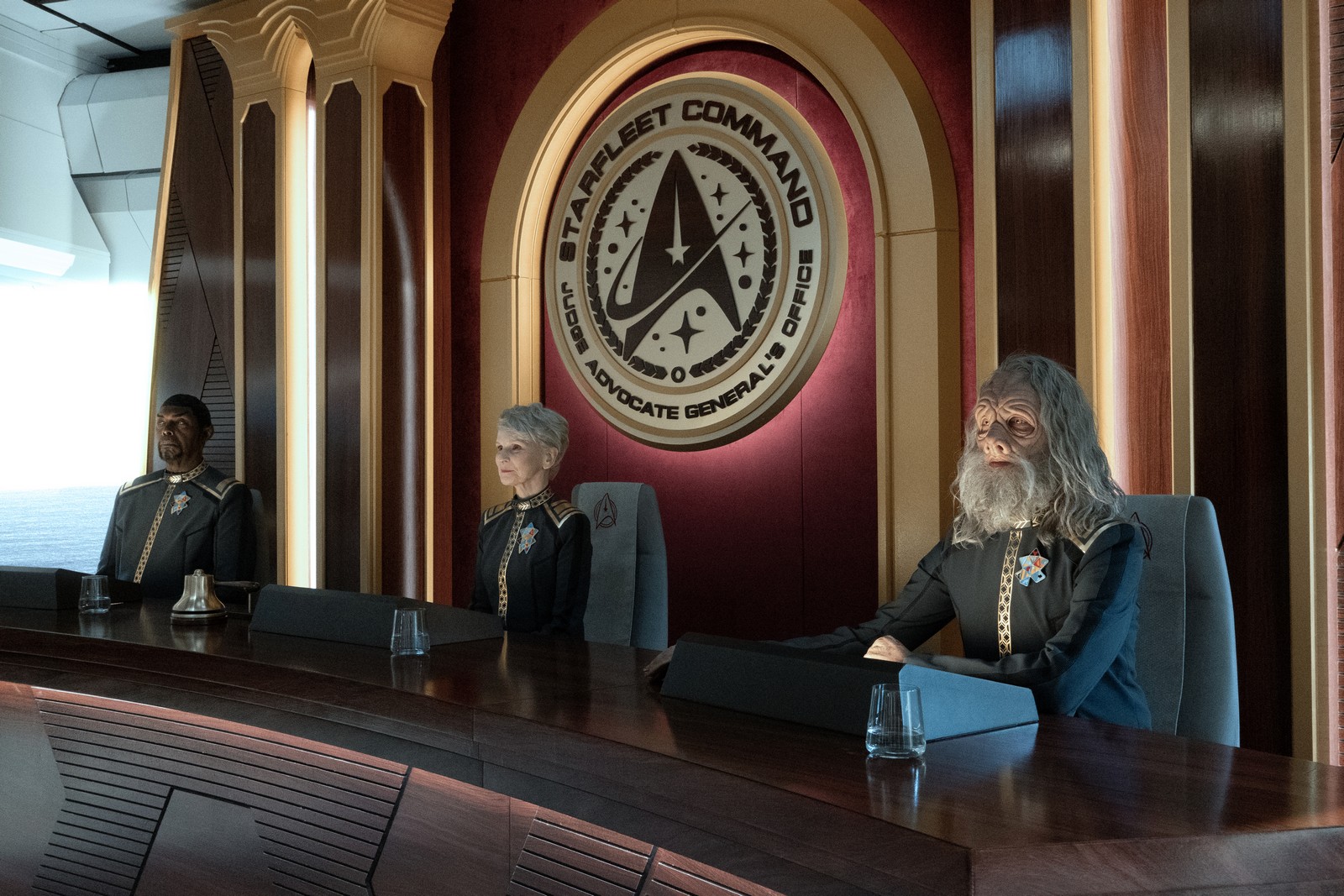“Ad Astra Per Aspera” Continues Star Trek’s Proud Courtroom Tradition
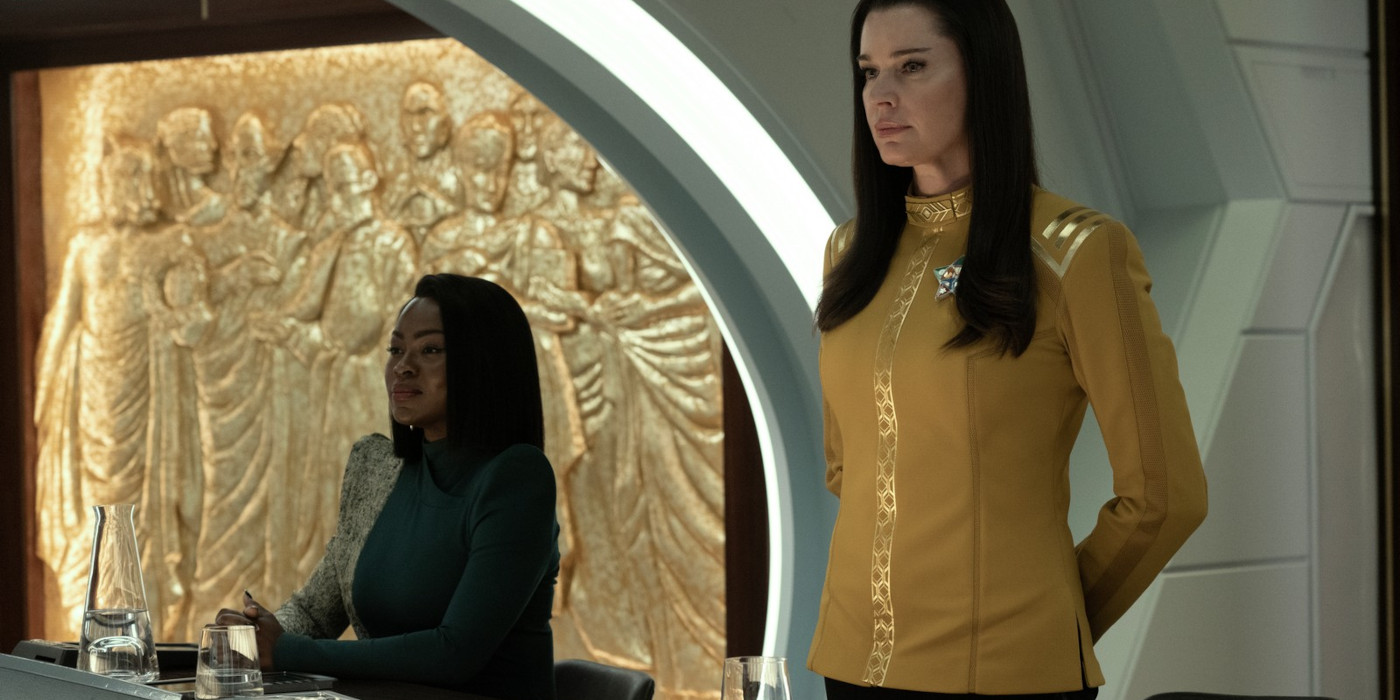
Star Trek: Strange New Worlds ended on a big cliffhanger with Number One being arrested. “Ad Astra Per Aspera” is what happens next.
Star Trek, as a franchise, has a proud tradition of courtroom dramas. Whether Kirk is fighting for his own career in “Court Martial” or Data is fighting for his silicon soul in “The Measure of a Man” some of Trek’s best stories take us to court.
This tradition continues in modern Star Trek. One of DISCO‘s best episodes “Unification III” involves Michael Burnham fighting to prove her own worthiness. But the show that needs a courtroom drama most is, unquestionably in my mind, Star Trek: Strange New Worlds.
The original Star Trek pilot “The Cage” did not see daylight until decades after the original series first aired. So for many years, the only thing Trek fans knew about Pike was “The Menagerie” – a story which, in and of itself, is part courtroom drama. That story weaves the tragic tale of Christopher Pike through the lens of Kirk as he desperately attempts to understand his science officer Spock’s mutiny.
In a way, Star Trek: Strange New Worlds is founded on courtroom storytelling. It’s only natural we find our way back there. And with “Ad Astra Per Aspera” we get what courtroom Trek episodes do best: a blistering analysis of justice (or the lack thereof) in our real world.
To Boldly Recap “Ad Astra Per Aspera”
The plot of “Ad Astra Per Aspera” itself is very simple. Pike convinces an old ally of Una’s, Neera, to come to be her counselor. Una’s former friend (and maybe more), like Una herself, is Illyrian. And, as a defense attorney, Neera attempts to fight oppression against her people across the universe.
Neera does not want to help Una for several reasons, not least of which is that Una usually hides her Illyrian status and works with the Federation, an institution that harms Illyrians. But Pike offers that Una’s case is so high profile that to take it on will only shine a brighter light on Illyrian injustice. And so Neera agrees to take the case.
The case itself is complex from the outset. By her own admission, Una keeps her Illyrian status a secret. And because Pike keeps that secret as well, it keeps him off the witness stand lest he incriminate himself and his crew. It doesn’t help that the prosecution includes Pike’s long-time romantic partner, Captain Batel.
Starfleet offers Una a plea deal to be dishonorably discharged and Neera turns it down. Starfleet says, okay: how about 20 years in prison? And with that, the stage is set for the court case to decide both Una’s fate and arguably the fate of all Illyrians.
More Than Una on Trial
Una is the only one literally on trial, but everyone else is figuratively on trial. Pike faces judgment for withholding Una’s secret. Starfleet faces judgment for their treatment of Illyrians. And La’an faces judgment against herself. She volunteers to aid Neera with the case. La’an believes Starfleet may have utilized personal logs to uncover the fact that Una is Illyrian in the first place.
Neera tells La’an to request access to all personal logs. Interestingly, it is Uhura who turns La’an down, not only because it’s against Starfleet regulations, but because Uhura sees La’an as a friend. Uhura won’t let La’an take an unethical path in the name of justice if it isn’t right or necessary.
And that’s when the truth comes out. La’an thinks she is responsible for Una’s arrest. She recorded a private log after the mission in “Ghosts of Illyrian” where she vents her frustration at Una keeping her Illyrian status a secret. But the timeline doesn’t bear out. La’an can’t be responsible for Una’s outing, but the defense knows who is.
“Ad Astra Per Aspera”
Neera calls a number of people to the stand. Admiral April gets a dressing down over the double standard of Starfleet regulations. Much of the Enterprise crew takes the stand to speak the praises of Una. And finally, Una takes the stand herself.
On the stand, Una explains her story. As a child, Una’s family lived in a world with both Illyrians and non-Illyrians. And when the Federation decided that Illyrians were a danger, the world was torn asunder. Illyrians live on one side, humans on the other. And Una’s family stayed on the human side because they could pass for humans.
There is a moment in Una’s past when she suffers an injury. Going to the hospital will reveal her as an Illyrian. She almost dies from her injuries but finds treatment at the last second from an understanding doctor.
Una feels hopeless but she does think there’s hope in Starfleet. “Ad Astra Per Aspera”. She thinks that she can take to the stars to fight her hardships. And when she tells Pike she is Illyrian she does so because she believes Starfleet’s goals will align with her own.
And of course, Una is the one who told Starfleet she is Illyrian. Una can’t hide anymore. She has to trust Starfleet to hear her out and do what is right.
A Long Road to Asylum
Batel’s boss is Vulcan and he makes an argument that none of Una’s emotional story matters. He believes that the letter of the law is simple: Illyrians bad. All augments bad. Una go jail now, bye-bye.
However, Neera makes a counter-argument: Una’s actions qualify her for asylum. The way she is treated in her home world put her life at risk. She joins Starfleet to find safety. She is honest about her being an Illyrian to her superior officer. And when she turns herself in, Una is, arguably, requesting asylum.
And this argument, while honestly pretty flawed, works. Una is reinstated as first officer of Enterprise. However, she is an exception – the laws against Illyrians and augments in general in the Federation remains intact.
Neera still considers this a small victory in the ongoing fight for Illyrians. And Una gets to be in Starfleet without having to hide who she is. The two hold hands because you know they were dating back in the day, right? And Pike gives Una a big hug because literally how would the Enterprise ever function without her?
To Boldly Review “Ad Astra Per Aspera”
We say it right at the top: Star Trek loves a courtroom drama. But I think it’s fair to say that, if you make a poll of all the courtroom episodes in all of Star Trek, “The Measure of a Man” wins handily. And I’m going to posit something else – in years to come “Ad Astra Per Aspera” will rival “The Measure of a Man”.
And the reason is obvious. This is an episode that does exactly what “The Measure of a Man” does, but maybe even better – it calls attention to a plight that was, is, and will always be. “The Measure of a Man” is about legal slavery. It is a story where Data must prove he has the same rights that all sentient beings do. And the reason that is in doubt is that he is an android.
“Ad Astra Per Aspera” posits a similar question – can Illyrian oppression be justified in the name of a perceived greater good? The answer, obviously, is no. But that’s the point. Science fiction exists in no small part as an analog to our real world. There are always people who will justify oppression and who will always have some manner of smokescreen to justify their abuse. And there are always people who will lose sight of what is right whether out of ignorance, fear, or both.
An Important Distinction
Guinan has to nudge Picard towards awareness in “The Measure of a Man”. He cannot see that a call for Data’s forced participation in a scientific study will lead to slavery as a matter of course because Picard has never known institutional suffering. For many people who watched Star Trek: The Next Generation in the late 1980s, that kind of oppression was unknown.
But the oppression was there. Whether we’re talking about demonizing Black people who need financial aid or queer people dying of AIDS, the 1980s was a brutal time in America. That particular brutality is largely via inaction. It’s allowing suffering to occur because it doesn’t affect the majority or because it impacts a minority deemed undesirable.
“Ad Astra Per Aspera” features a defense attorney who knows exactly what’s happening because she and Una are both Illyrian. They face a similar struggle – the only difference is that one once hid what they are and the other never could.
I think it’s very pointed that, in a time where trans people are coming out in larger numbers and learning, some of them for the first time, what active oppression is, that Star Trek has an episode where a white woman facing more open and aggressive oppression must seek salvation from a Black woman who sees that aggression every second of her existence. Star Trek doesn’t do subtle. Good thing, too, because most people don’t see things until they’re hit over the head with a hammer.
Right Here, Right Now
“Ad Astra Per Aspera” is about the power of receiving (and granting) asylum. But it’s also about asylum’s limitations. We can take in refugees and offer them a life where they may live as they choose, but the original injustice still persists. This is especially true when the asylum seekers exist within one’s own nation. In this case, Una seeks asylum from Starfleet and is granted it, however, the Federation itself is still the reason for her (and all Illyrian’s) oppression.
And yes, we see that right now. Trans people and their families are literally fleeing states like Texas and Florida and seeking asylum. That other states accept asylum seekers is great, but the need for these people to flee their homes still exists and still gets worse by the day.
That Neera is played by a Black woman is no mistake. Lots of white trans people are learning firsthand what it is to be treated with hostility as a perceived other. And Una faces acceptance in a way that Neera does not. Internal struggle? Una lives with it constantly. But the outward oppression is new to her and even muted in some cases. And that’s just like how some white trans people are often treated with more understanding than their Black counterparts. Again, Star Trek: NOT SUBTLE.
There’s a complexity in that Neera and Una seem to have some past romantic relationship. On the one hand, it’s great to see queer rep in Star Trek, especially in a story with real-life queer connections. On the other hand, Strange New Worlds tends to play it very safe on queer rep and I wish they’d be more textual about it with their main characters.
Easy Asylum
One of the best parts of “Ad Astra Per Aspera” may also be its most contentious. After all, Neera’s argument that Una was seeking asylum the whole time is not the strongest one. Una isn’t literally seeking asylum so much as she does things that sorta, kinda, maybe can be read as seeking asylum if you’re not thinking about it too much.
But emotion dictates the law all the time. That’s why Vulcan literalism doesn’t work here. The right passionate plea can cause the reading of the law to change because the law is a living, breathing thing.
But also the execution of this law is an exception, not a rule. And that is very telling and very real. Una is human-passing so she gets to keep her commission. And while “The Broken Circle” never comes up, the Gorn war likely factors in, too. Pike says that Enterprise needs Una. It’s very likely that Starfleet agrees.
Season one of SNW posits that incredible growth is possible. “Ad Astra Per Aspera” reminds us that growth still takes time. Una and the Federation both still have a long way to go. And Neera is correct to use Una’s case as a stepping stone towards greater rights for Illyrians across Federation space.
Yetide Badaki
This is the second episode in a row where Captain Pike is not the lead. But whereas “The Broken Circle” is a wonderful episode because it is an ensemble piece, “Ad Astra Per Aspera” still has a focal point – and it is its guest star. This is a heavy episode that requires the kind of quiet charm that can endure even when things get heavy.
What Yetide Badaki does as Neera in this episode is nothing short of phenomenal. Last week Carol Kane brings a little Whoopi Goldberg energy as Pelia because she’s playing an immortal, much like Guinan. But it’s Yetide Badaki’s bid towards Guinan-dom that makes “Ad Astra Per Aspera” a “The Measure of a Man” level episode.
In “The Measure of a Man” Guinan is a bit player with a pivotal role. But this time our Picard analog, Pike, gets sidelined, and it is our proverbial Guinan, Neera, who takes center stage as defense counsel. In the hands of a lesser actor, this never would have worked. A guest star as the lead? It’s a big no-no. But in the hands of Yetide Badaki, “Ad Astra Per Aspera” is more than a great story – it is an unforgettable, world-changing one.
I have no questions, queries, or quibbles. This is an episode worth basking in. Perfect television. Simply incredible.
5/5 stars


